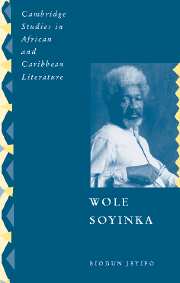Book contents
- Frontmatter
- Contents
- Preface
- Chronology
- List of abbreviations
- Chapter 1 ‘Representative’ and unrepresentable modalities of the self: the gnostic, worldly and radical humanism of Wole Soyinka
- Chapter 2 Tragic mythopoesis as postcolonial discourse – critical and theoretical writings
- Chapter 3 The “drama of existence”: sources and scope
- Chapter 4 Ritual, anti-ritual and the festival complex in Soyinka's dramatic parables
- Chapter 5 The ambiguous freight of visionary mythopoesis: fictional and nonfictional prose works
- Chapter 6 Poetry, versification and the fractured burdens of commitment
- Chapter 7 “Things fall together”: Wole Soyinka in his Own Write
- Notes
- Bibliography
- Index
Chapter 3 - The “drama of existence”: sources and scope
Published online by Cambridge University Press: 22 September 2009
- Frontmatter
- Contents
- Preface
- Chronology
- List of abbreviations
- Chapter 1 ‘Representative’ and unrepresentable modalities of the self: the gnostic, worldly and radical humanism of Wole Soyinka
- Chapter 2 Tragic mythopoesis as postcolonial discourse – critical and theoretical writings
- Chapter 3 The “drama of existence”: sources and scope
- Chapter 4 Ritual, anti-ritual and the festival complex in Soyinka's dramatic parables
- Chapter 5 The ambiguous freight of visionary mythopoesis: fictional and nonfictional prose works
- Chapter 6 Poetry, versification and the fractured burdens of commitment
- Chapter 7 “Things fall together”: Wole Soyinka in his Own Write
- Notes
- Bibliography
- Index
Summary
Event in literature is experienced according to the scale of its treatment.
Wole Soyinka, Myth, Literature and the African WorldDrama in particular, no doubt because it is the most social of the arts, provides the site in which this inherent menace is most strident. In whatever country in black Africa that you open the curtain, you will find that in the absence of genuine democracy, the life of drama is lived on the edge of the cliff … The stark reality impresses itself upon us: all dramatists with a conscience know that when they play, they play dangerously.
Femi Osofisan, “Playing Dangerously”Bad playwrights in every epoch fail to understand the enormous efficacy of the transformations that take place before the spectators' eyes. Theatre is change and not simple presentation of what exists; it is becoming and not being.
Augusto Boal, Theatre of the Oppressed.Soyinka's achievement in drama, relative to the other forms and genres of literary expression, is a fascinating combination and synthesis of individual talent and sensibility, formal institutional training and practical theatre experience, and the weight of received, subliminally absorbed cultural tradition. His early work in the British theatre at a time of important aesthetic and political redirection in that theatre has been amply documented, though not critically assessed.
- Type
- Chapter
- Information
- Wole SoyinkaPolitics, Poetics, and Postcolonialism, pp. 83 - 119Publisher: Cambridge University PressPrint publication year: 2003



